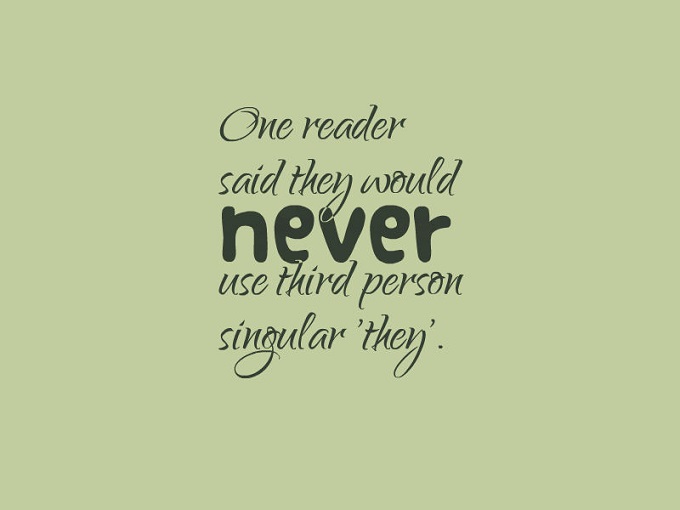Okay. Crack knuckles. Stretch back. I’m diving in with a big, huge, MAMMOTH-SIZED grammatical topic at the request of Maxabella.
We all know the third person singular pronouns. He, she and it. (Side note: we’ll use the subject form of pronouns for this post to keep it shorter, but the argument applies across the board.)
One might use one if one begins a sentence with one (and if one is the Queen), but in all other circumstances – in most circumstances – you’re choosing between the other three.
So what pronoun do you use if you’re talking about someone (a single someone) in the third person without knowing their gender?
Enter ‘they’. The third person plural pronoun. It is often adopted for use in singular contexts where the gender is not known.
But should it be?
—
I asked some of my readers what they thought of this.
Opinions varied, ranging from outrage at the use of a plural pronoun in place of a singular to the belief that the use was so common as to be acceptable.
The pronoun is one of those word categories that is resistant to change, and resistant to new members. New nouns, verbs and adjectives enter our lexicon all the time. But ‘I’, ‘me’, ‘you’, ‘he’, ‘she’, ‘it’, ‘we’ and ‘they’ (and possibly, but not really, ‘one’) have been the sum total of our subject pronoun collection for a very long time.
Throughout the history of English, there have been attempts to introduce a new gender-neutral pronoun. ‘Shim’ was a favourite in Australia for a while (in some – very small – circles), though never truly gained traction.
I don’t find it surprising that when our need for a gender-neutral pronoun became so great that it could no longer be ignored, we instead turned to an existing pronoun and extended its meaning.
—
For me, as ever, it all comes down to communication and comprehension. When someone uses ‘they’ as a singular pronoun, do we understand what they are saying?
Well, did you understand that sentence? Because I just did it. Tick for communication and comprehension.
‘They’ avoids the clunkiness of using ‘he and/or she’. ‘They’ avoids the Queenliness of using ‘one’. ‘They’ avoids the inevitable claims of sexism of using either ‘he’ or ‘she’. ‘They’ avoids the offensiveness and possible confusion of using ‘it’.
Don’t get me wrong. ‘They’ is imperfectly used at the moment. If you use ‘he or she’, the verb remains as it would for ‘he’ or ‘she’. If a fan rushes the stage at the One Direction concert, he or she knows that he or she will be kicked out of the concert.
But if you use ‘they’, the verb agreement switches to plural despite ‘they’ being used as a singular. If a bouncer kicks a fan out of the One Direction concert, they know there’ll be tears.
So the use of ‘they’ as singular isn’t so prevalent and acceptable that the verb agreement has switched.
—
Okay. That was fun. Lots of thoughts and observations swirling around. But where’s the helpful bit? Like, you know, what should you actually, you know, do?
If you’re writing for a publication, consult the style guide. If there is no specific instruction for third person pronouns, ask your contact for their stance.
If it’s not addressed and you don’t feel comfortable asking, reword the sentence in question. There should be a way to communicate your point without the sentence structure that requires the pronoun. Can you make the subject plural? If bouncers kick a fan out of the One Direction concert, they know there’ll be tears. Can you break the sentence into parts? A bouncer may have to kick a fan out of the One Direction concert. There’ll be tears. Can you reorder it? There’ll be tears if the bouncer kicks a fan out of the One Direction concert.
If you’re writing a formal or technical document, ‘he or she’ may be acceptable. If a fan breaches security at the One Direction concert, he or she must immediately be escorted off the premises. If you don’t like the way it sounds, but cannot think of an alternative, you could always use ‘he or she’ and attach a note that ‘they’ may sound smoother if the client prefers.
If all else fails, just use ‘they’. Embrace the trend. And be ready to explain your decision to the client.
I truly believe that one day, we will accept ‘they’ as the gender-neutral third person singular pronoun. I don’t yet know if we will accept it to such an extent that we use singular verb agreement with it. It sounds odd to me, but once upon a time, ‘they’ in this context sounded odd full-stop.
Only time will tell.
—
Okay. I’m ready for a lot of disagreement. What do you think? Do you use ‘they’ as a gender-neutral third person singular pronoun? Does it grate when you hear it?




I use it occassionally. It doesn’t bother me too much- not when there is so much worse out there!
Absolutely. I’m quite a fan actually. How clever are we that we can use the same word and work out from context whether it’s singular or plural?!
I agree. In written form I still tend to say “she or he” or “s/he”, but spoken language I would think I always say “they”. That’s the beauty of the English language. It is not fixed. It changes as our needs change. I will never embrace orientate though. That’s taking it too far. Just sayin’.
Haha, I’m with you on orientate! Or relevancy. What’s wrong with relevance? (That said, we know what people mean when they use them, so meh.)
So nice to see a comment that acknowledges the evolution of the English language!
I often use ‘they’ for mystery shopping audits, where I need to report on a staff member’s actions or services without revealing their gender.
Perfect! And I bet no-one bats an eyelid when they read it.
I use it and don’t even think twice (until now). Yep, I am one of “those people”. Thanks for this morning’s english lesson. I enjoyed it.
I love ‘those people’! Like I said, I think that’s where we’re headed anyway. You’re an early adopter!
Thank you, Em. That was a fascinating read and it’s been very helpful, sort of. There is just no way to really know, is there? We are ‘between’ language with this one I think. Which is odd when the whole non-gender specific thing has been around for the better part of 3 decades.
I use ‘they’ a lot, mainly because the whole ‘he or she’ thing is so clunky. I write in the parenting space and it can be strangely alienating for the parent audience to be reading about ‘him’ when they have girls and vice versa. So for lack of anything better, ‘they’ is a nice catch-all for both genders. If I wrote ‘he or she’ or the dreadful ‘s/he’ every time I was referring to a child, my lovely, chatty writing would read like a manual. I have never heard of ‘shim’ but I’m very glad it died before I met it. x
‘Between’ is a good descriptor. We’re between acceptance I think, but the practice is definitely there. And in many style guides. Just a matter of time, methinks.
Good point about parenting writing specifically. It is hard to separate your own child from hypothetical child of hypothetical gender. ‘Shim’ is awful. Awful awful awful.
Excellent!
Thanks Kirsty!
Thank you, thank you! I know when things sound clunky when I’m using s/he or they but often get stuck on what to do. Changing the sentence structure is usually the last thing I’d think of! Thanks for bringing it forward in my mind x
I don’t find ‘they’ clunky at all but my editing brain notices it every time. And pleasure. There’s a way around it most of the time.
Thanks Em! I’m not a fan of ‘they’ (because I’m too literal, and there is not more than one person that I am talking about), but ‘he or she’ is so clunky. For writing, I wish s/he would be more acceptable (but I know why it isn’t) and, of course, it doesn’t work in speech. I guess we are stuck with ‘they’, and I’ll get more used to it.
I don’t like s/he but that’s my relentless sticking to the original purpose of the slash which has moved on. So that’s my problem! Moving on…
I’m happy with they. I think it’s clever. I feel sorry for those learning English as a second language because the tense agreement is difficult.
Agh! I never found ‘they’ to be confusing before ever and now I am so confused and overthinking it! Haha. I think I need to reread this AFTER coffee. #teamIBOT
Oops. Sorry! Not my aim! I hope it made more sense after the coffee. x
I use”they” knowing each time that I should be using something else but don’t, probably out of laziness. I’m enjoying these grammar lessons and really need to lift my game!
Not lazy! Like I said, I use it too and I think the powers that be (dictionary editors perhaps?) will accept it as common practice in English soon enough.
Errrr, I don’t know… yes…. maybe? I will defer my answer to more intelligent folk!
That would include you, Hugzy! You can’t pretend with me.
I rarely use it in my formal writing but often make light of what ‘they’ say – as a piss take. It’s not something I’d ever write if I was having work published or printed online etc. But right now I’m a News Ltd style girl, used to be Fairfax in NZ. x
Agreed – if submitting somewhere, I’d not use it unless it was in their style guide.
I like your idea of rewording/reworking the sentence structure to avoid the ‘they vs she/he’ issue altogether. I agree that he/she gets clunky and admit that sometimes I get lazy and just use the one gender and hope that people just get it…
Thanks Laney. I think that’s as good a solution as any!
I don’t believe I’ve ever consciously thought about it. I suppose I have; when the circumstances called for it, but not so much that I have thought to really spend time wondering about it.
You know what I’m going to be doing tonight now don’t you? 😉
Sorry! Wasn’t meant to make anyone paranoid – I’m empowering you! USE THEY WITH RECKLESS ABANDON!
Very interesting Em! I use they but will be more conscious of this now and will no doubt be re-writing, editing, re-writing…
Shim.. really? Glad that one didn’t take off! 😉
xx
Hooray for the rewrite! Always a good option.
Well I completely missed the ‘shim’ craze, when was that?!!!
I think it depends on context – I use ‘they’ for informal writing (my blog, humorous parenting articles), but don’t *think* I would for more report-style writing, or professional writing. But having said that, I’d have to double check!
It wasn’t a ‘craze’ as such, just an idea someone had that had a surprising number of people in support of it.
Your approach sounds just like mine!
I’m with Amy – it doesn’t bother me too much as there are far worse crimes against grammar out there. After reading this post something tells me you have crowd control at One Direction concerts on your mind.
Haha, my kids are actually too young for One Direction. I must have just been reading a Hugzilla post!
This is great, thank you. I often use they rather than he/she and I’ve never ever heard of shim. That’s just plain wrong. Okay, so I have a question for you. I’ve been proofing a booklet with training related content. The sentence I wrote was something along the lines of: ‘XYZ organisation is a child care facility based in Brisbane. Their dedication to vocational education and training is second to none.’ I had someone query me on the use of ‘their’ saying it should be ‘its’ because it’s an organisation and not a person. Thoughts? Also, I often feel like I’m jumbling up my tenses in my writing. I’ve read you can do that across different paragraphs in the one narrative, but not in the same sentence. Am I making any sense? Would love a how to on that please.
Thanks Renee! If you’re sticking to the grammar rules, then yes, ‘its’ is required. But most organisations relax this in their style guides because they want the personal ‘we’re there for you’ feeling to come through in their comms. So check the style guide. If there isn’t one, ask.
Ways to avoid it: use ‘its’ (impersonal); rewrite (‘At XYZ, our dedication to vocational education and training is…’ or ‘The staff’s dedication to vocational education…’ or any number of other options; write in passive voice (I hate this but you see it around); Restructure the sentence so that the education and training is the subject (‘Vocational education and training is important at…’.
Just a few examples. Hope that gets the cogs turning. Like I said though, in most instances there’s actually nothing wrong with what you’ve written.
Tense? Big can of worms. I don’t think I’ve got enough information from you to work out what you mean in this case. Will email. x
Okay great thank you and great help with the their vs its. Will work on it xx
I enjoyed reading this and had to stop and think about what I’d do in that situation. I’d probably shuffle the sentence to avoid it if I could!
An excellent strategy!
Ok I didn’t realise I was breaking the rules here. Off to study the style guide again!
Not breaking the rules! Like I said, I do it – most people do it – and we all understand each other just fine. I love it as a solution to the gender-neutral problem.
I vote with majority rules. Language is there for communication – words are more eloquent than grunts. If the meaning is clear, she’s right mate!
YAY! Bec gets it! x